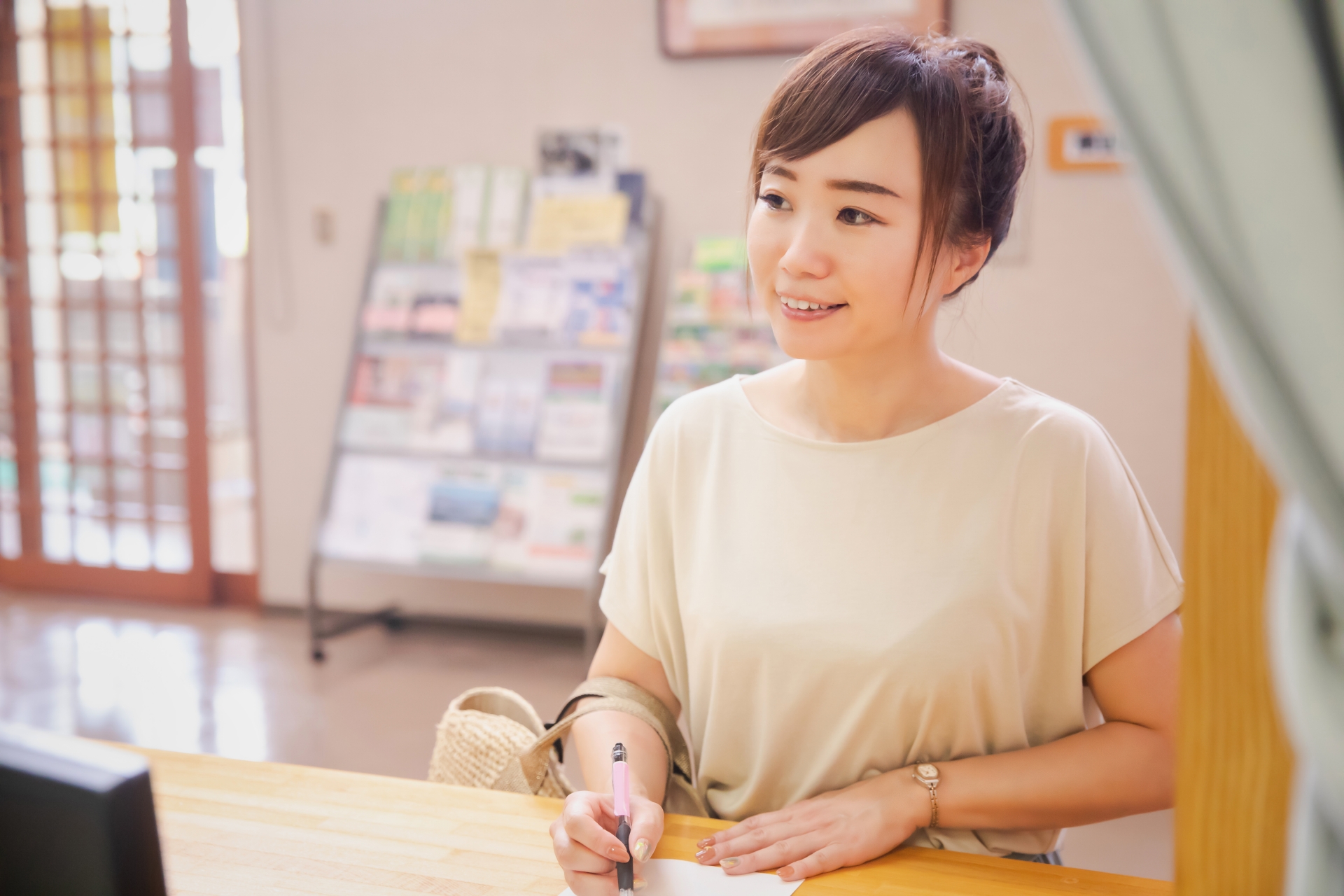When going sightseeing in Japan, interacting with your hotel or ryokan will be a big part of your journey. Accommodations in large cities with many tourists may have English-speaking staffs to welcome foreign guests, but unfortunately, not all accommodations do all over Japan. This article will introduce some basic phrases in Japanese that can be used in hotels, such as when you check-in and check-out.
1. Making a reservation

To stay in a hotel or ryokan room, you first need to make a reservation in advance. When booking a room, it is very important to know what kind of room is available and how much it will cost per night. Although it is now easy to obtain basic information from the official websites of lodging facilities on the Internet, unfortunately, not all of them in Japan have such information available in English, so you may need to ask them directly via a call or email. In this section, we will introduce phrases that can be used over the phone or by e-mail when making room reservations.
What kind of rooms do you have?
どんな部屋の種類がありますか?
Donna heya no shurui ga arimasuka?
This phrase is used when you want to know what kind of rooms a hotel or ryokan has. “どんな(donna)” means “What kind of ~” and you can know if their room will match your needs. Now, let’s learn some vocabulary which you may hear as an answer from the staff.
| Meaning in English | Japanese words | Pronunciation |
| Single room | シングルルーム | Shinguru rūmu |
| Double room | ダブルルーム | Daburu rūmu |
| Twin-bedded room | ツインルーム | Tsuin rūmu |
| Suite room | スイートルーム | Suiito rūmu |
Or, if you are not confident about choosing the type of room, you can tell the staff how many people, including yourself, will be staying there. Then the staff may be able to recommend a suitable room for you. In that case, say the following phrase.
I would like to stay with ◯ people.
◯人で泊まりたいです。
○ nin de tomaritai desu.
You have to put the number in ◯ as the number of your people. In order to know how to count people in Japanese, this website can be helpful for you.
Next, after you have decided on the room you want to stay in, ask how much it will cost per night.
How much does the room cost per night?
その部屋は一泊いくらですか。
Sono heya wa ippaku ikura desuka?
“いくら (ikura)” is a very useful word for sightseeing in Japan. When you are shopping and do not know the price of an item or service, you can use this word to find out how much it will cost. “Ippaku (一泊)” means “per night” in English.
By the way, there is one thing you should be very careful about when booking a hotel/ryokan room in Japan. Hotels in other countries usually charge by the room, but in Japan, hotels & ryokans charge by the person. Therefore, it is important to keep in mind that there is often a charge for each person.
After you are satisfied with the room type and price, finally let’s make a reservation. Tell them the duration of the dates you want to stay, the number of people, and the type of room you want.
2. When you arrive at the hotel
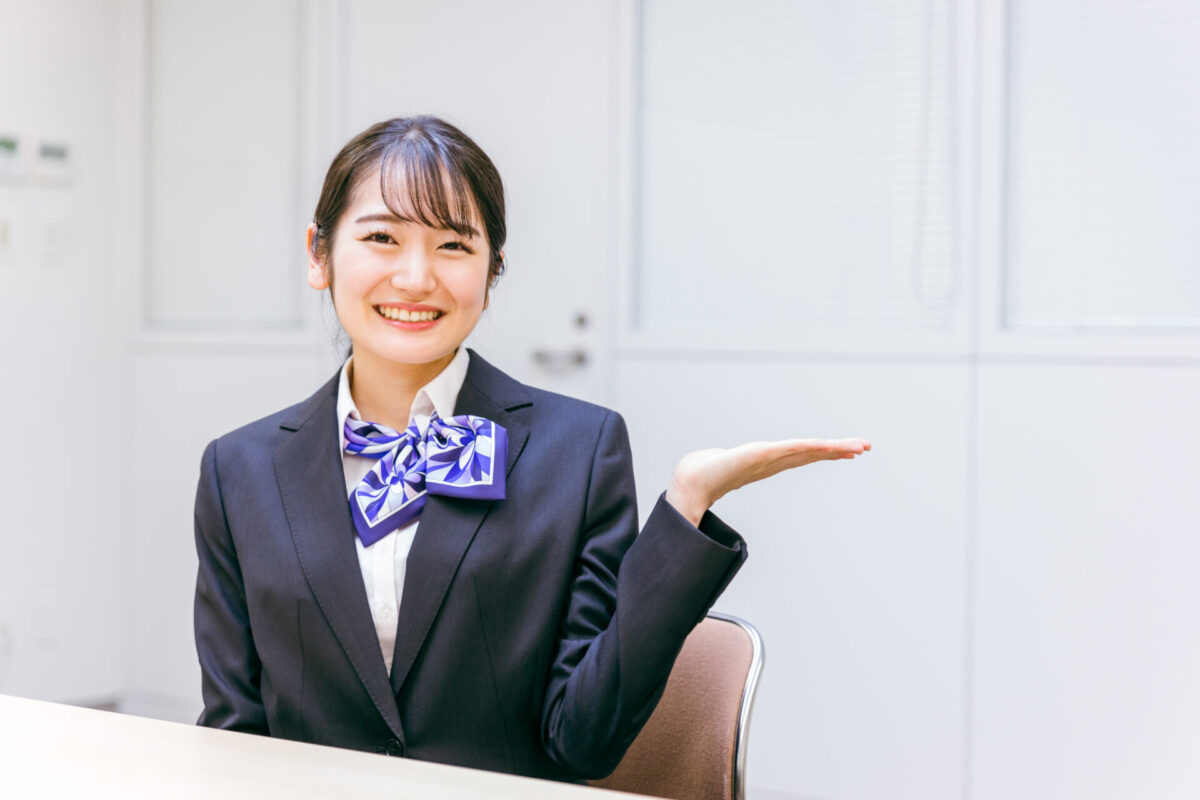
After a long flight, you can go straight sightseeing or take a short rest at your hotel. In that case, you should check in to your hotel. Here is a suitable phrase that you can use.
I would like to check in.
チェックインをお願いします。
Chekku in wo onegai shimasu.
After your check-in, they will show you the room you will be staying in and give you the key for it. The time of day when you can check in varies from hotel to hotel, so it is important to check it in advance.
3. During your stay at the hotel
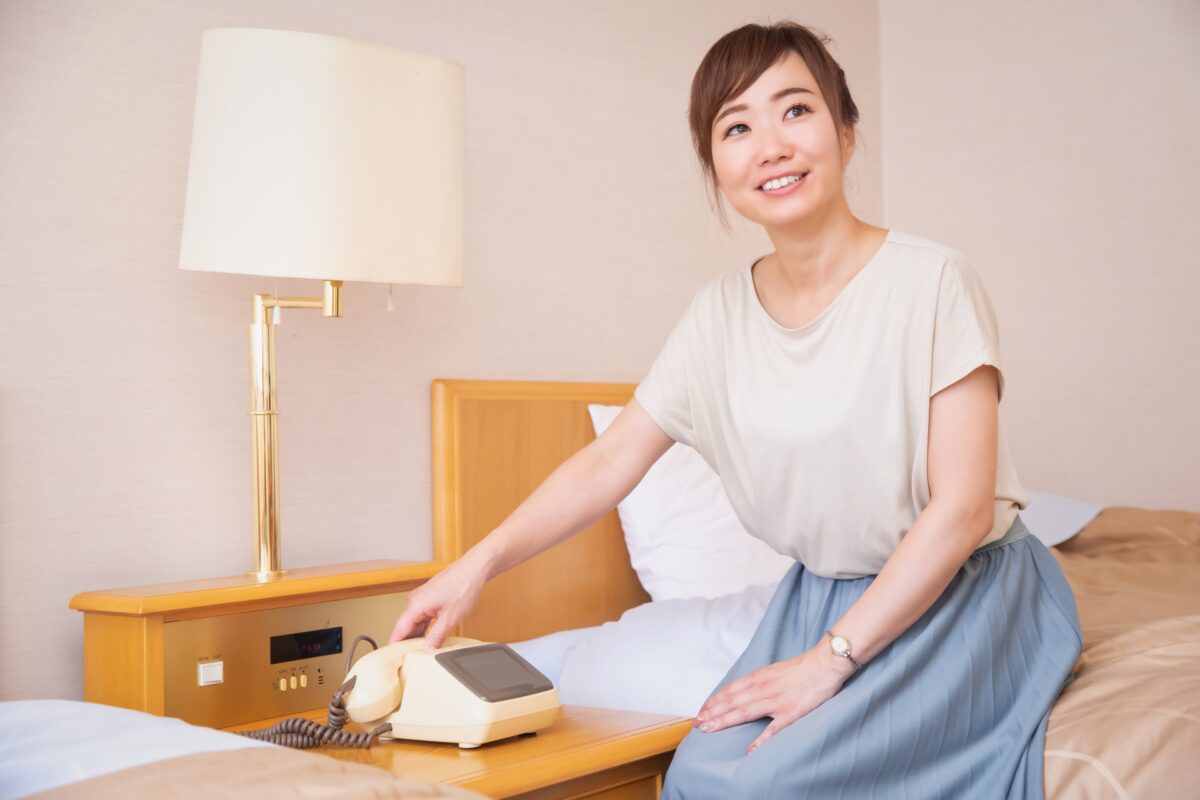
After check-in, you can finally stay in your room! Most hotels and ryokans have a telephone in their rooms, so you can call the front desk if you have any problems. Depending on the hotel, you may be offered a variety of services during your stay. You can likely find a list of available services on the table or in the desk drawer of most hotels. Here are some phrases you can use when you want to use a service.
◯◯ service, please.
◯◯のサービスをお願いします。
◯◯ no sābisu wo onegai shimasu.
◯◯ will be the name of the service you want. Here are some possible services you may be able to use there.
| Meaning in English | Japanese words | Pronunciation |
| A wake-up call | モーニングコール | Mōningu kōru |
| Drink | ドリンク | Dorinku |
| Snack | スナック | Sunakku |
| Breakfast | ブレックファスト | Burekku fasuto |
| Lunch | ランチ | Ranchi |
| Dinner | ディナー | Dhinaa |
| Anniversary cake | アニバーサリーケーキ | Anibaasarii kēki |
When using room service for meals and drinks, tell the staff what you want to eat (or drink). Also, when you want to use a wake-up call, make sure to tell them what time you want to be woken up.
For your information, some hotels offer an anniversary cake and you can order it for family, friends, and loved ones for birthdays, weddings, and other anniversaries, and the staff will bring it to your room. If you want to make your trip to Japan more memorable, why don’t you try this service? However not all services are free, so be sure to check the price in advance.
4. When you leave the hotel

When your fun-filled trip to Japan comes to an end, unfortunately, you will have to leave the hotel. Be sure to check out by the check-out deadline informed to you in advance by the front desk staff. When you have finished packing and are ready to go, go to the front desk and check out. Here is the phrase when you want to check out.
I would like to check out.
チェックアウトをお願いします。
Chekku auto wo onegai shimasu.
The staff will then immediately begin the check-out process for you. The next step is payment. Many places accept cash or credit cards for payment. Here is a phrase for your payment.
I’ll pay by cash (credit card)
現金 (カード) で支払います。
Genkin (kādo) de shiharai masu.
After your payment is made, all that is left is to do is to hand the room key to the staff. Now your check-out is complete! If you have already paid by card or other means at the online reservation site, you do not need to say the above phrase. Just hand over the key and the check-out procedure is finished.
Oh, of course, don’t forget to say “ありがとうございました。(Arigatou gozaimashita, thank you very much)” to your hotel staffs with your smile if you get satisfied with their services when leaving. Anytime they are very happy to hear your gratitude.
5. When you are faced with unexpected troubles
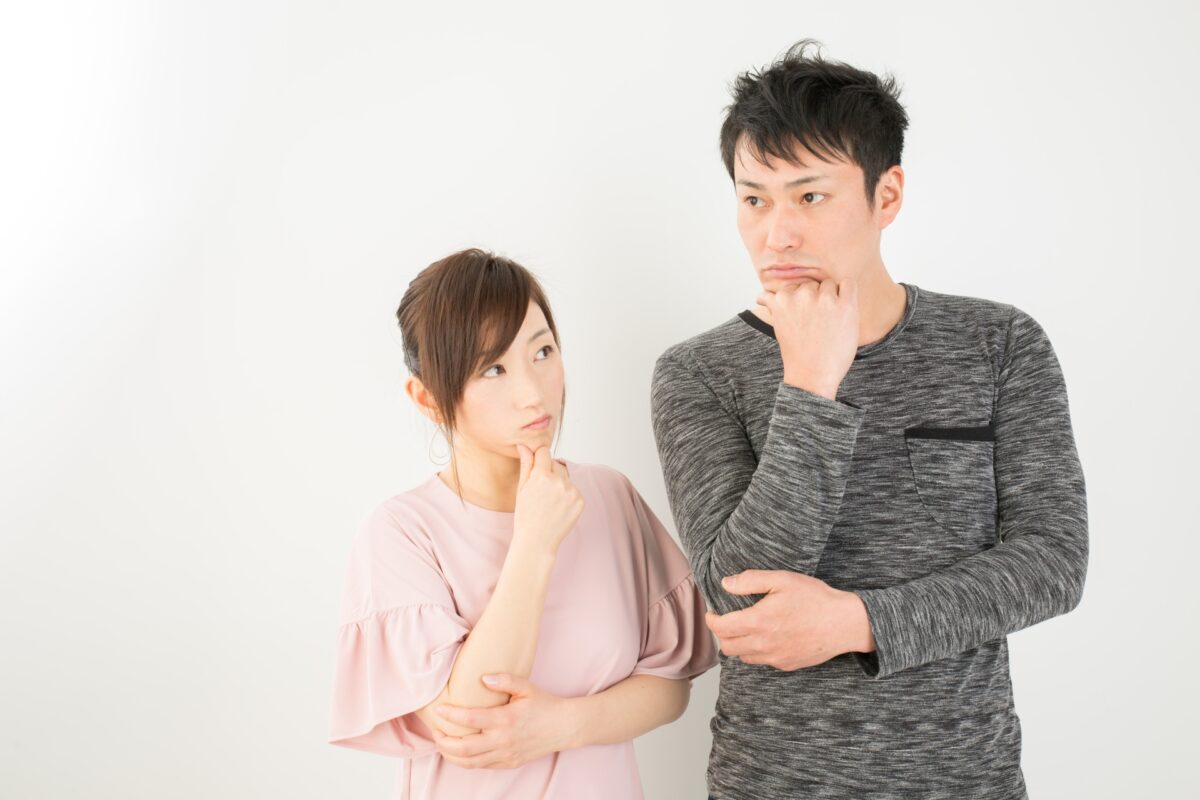
Lastly, here are some phrases to use if you run into trouble at a hotel. The best thing is not to get into trouble, but if you do, call the front desk immediately. In this section, we will tell you how to deal with common troubles there.
First, here’s what to do when you want to connect to Wi-Fi but can’t get it to work. Many hotels in Japan offer Wi-Fi for free, and they usually provide instructions in multiple languages, but even so, there are times when the connection does not work. In that case, you can contact the staff by saying the following phrase. Depending on the phone or computer you have, they should be able to help you as much as possible.
How can I connect Wi-Fi to my smartphone (computer)?
どうすれば私のスマートフォン (パソコン) にWi-Fiを繋ぐことが出来ますか?
Dousureba watashi no sumaato fon (pasokon) ni waifai wo tunagu koto ga dekimasuka?
The next one is a phrase for when any hotel equipment is broken. If the damage is not intentional, the hotel will take care of it for you. Here is the phrase.
◯◯ is broken.
◯◯ が壊れました。
◯◯ ga koware mashita.
The words that go in the “◯◯” column are fixtures in the hotel room. We have prepared a list of words for them below, so please take a look.
| Meaning in English | Japanese words | Pronunciation |
| Television | テレビ | Terebi |
| Shower | シャワー | Syawaa |
| Microwave oven | 電子レンジ | Denshi renji |
| Air conditioner | エアコン | Eakon |
| Safety box | 金庫 | Kinko |
| Remote control | リモコン | Rimokon |
| Light | 明かり | Akari |
| faucet | 蛇口 | Jyaguchi |
If you want to solve problems well in English, one way is to ask if the hotel has English-speaking staff. Ask the hotel this way.
Do you have any staff who can speak English?
そちらに英語を話せる人はいますか?
Sochira ni eigo wo hanaseru hito wa imasuka?
Now, this article has introduced Japanese phrases that can be used in various situations at hotels. Recently, high-quality translation apps have become available, so if you have something else you want to say, you can use them as well as an option. If you have any problems or questions, don’t hesitate to ask the staff. They will try to help you as much as they can. If you learn Japanese and decide to stay in a Japanese hotel, why not try using phrases you can use at the hotel?
Japan Wonder Travel Tours
Japan Wonder Travel is a travel agency that offers guided tours throughout Japan.
From private walking tours to delicious Food and Drink tours, we can help you organize the best tours just for you! If you want to explore Japan and learn more about the history and backstories of each area you are visiting, our knowledgeable and friendly English speaking guides will happily take you to the best spots!
In addition, we can provide you with any assistance you may need for your upcoming trip to Japan, so please feel free to contact us if yu have any questions or need some help!
▶Tokyo Tsukiji Fish Market Food and Drink Tour
Explore the most lively and popular fish market in Tokyo and try some of the local’s favorite street foods and sake with one of our friendly and knowledgeable English speaking guides!

▶Tokyo 1–Day Highlights Private Walking Tour (8 Hours)
There’s no better way to explore an area than taking a tour with a knowledgeable local guide. You will have the chance to learn about the history and interesting background stories of Tokyo, as well as discover some hidden gems which can be hard to do without a guide.
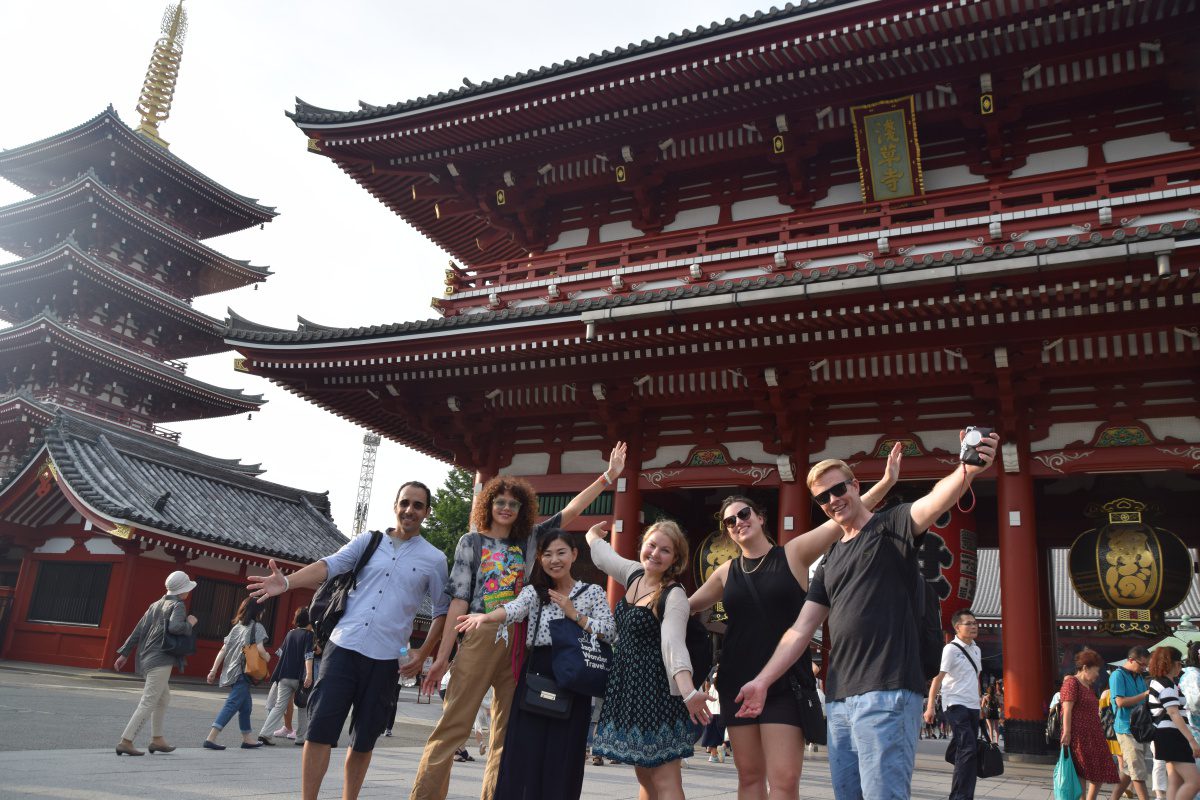
▶Mt. Fuji Day Trip Bus Tour from Tokyo
Experience the breathtaking views of Mt. Fuji by visiting the highlights of the area on our guided sightseeing bus tour! Departing from Shinjuku in central Tokyo, you can travel comfortably to all of the best spots in the area by bus.
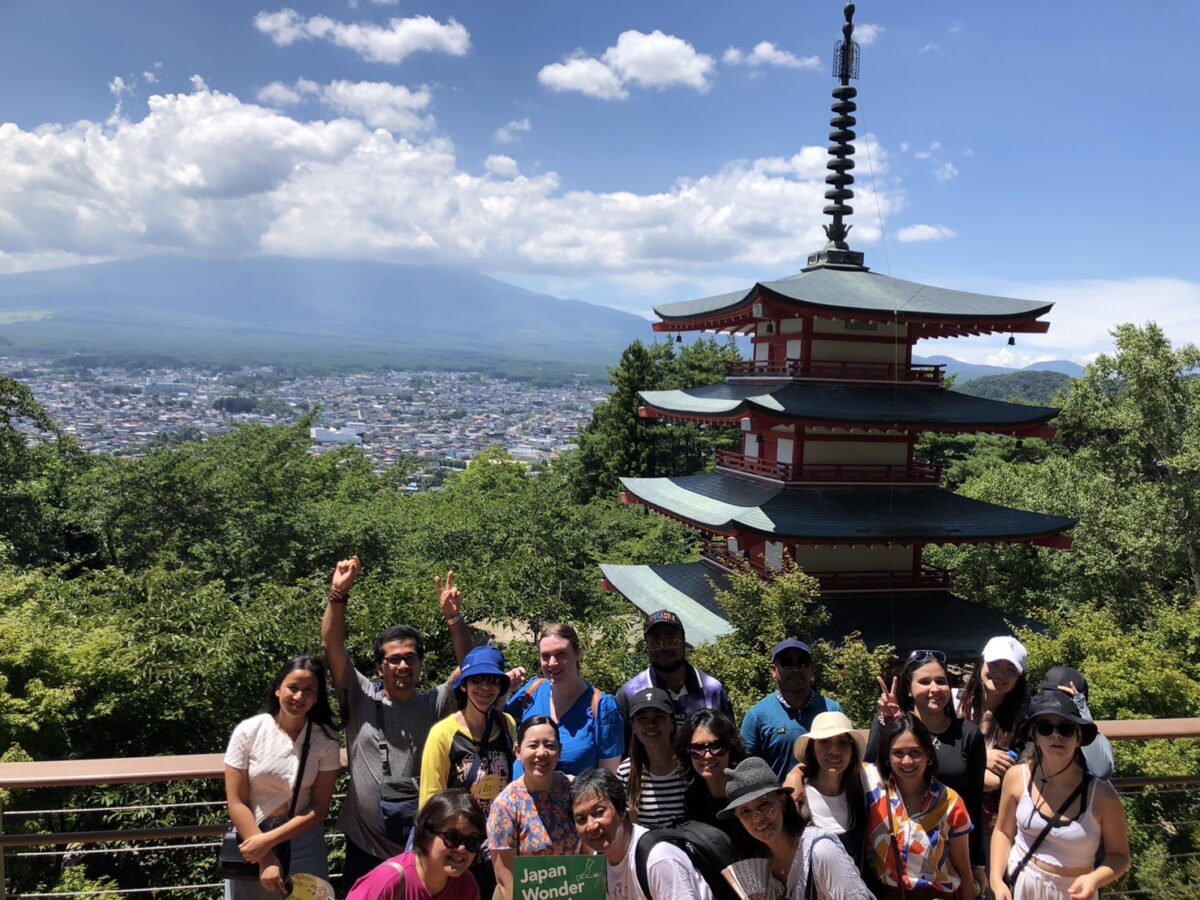
Follow us on Instagram, Facebook, and Twitter for more travel inspiration. Or tag us to get featured!
Happy traveling!
Other articles you might be interested in

Mao Goto is a Japanese freelancer who was born in Hayama, Kanagawa prefecture and raised in Tokyo. Since 2016 she lives in the Taito Ward, home to a lot of Japanese culture hotspots such as Asakusa, Akihabara, and Ueno. She has been interested in the field of English education in Japan and got her Master’s degree in March 2020. A lover of photography, travel, sweets, and cross-stitch. Contact her via Facebook.
This post may contain some affiliate links. When you click through and make a purchase we may receive some commission, at no extra cost to you.
